Why Would Microsoft Invest In A Dell Buyout?

Although shares of Dell Inc. (NASDAQ:DELL), the No. 3 PC maker, mostly fell slightly in Wednesday trading, they’ve gained more than 26 percent since speculation rose last month that the company was considering a management buyout.
Now, financial sources say the biggest technology buyout ever, valued around $22 billion, may be nearing completion for the Round Rock, Tex.-based PC maker that now derives about 40 percent of revenue from storage products, services, software and consulting.
Led by Silver Lake Partners, the Menlo Park, Calif.-based private equity specialist, Dell would be acquired by a new entity that presumably would leave founding chairman Michael S. Dell, 47, at the helm but reporting to Silver Lake, as well as banks, headed by JPMorgan Chase (NYSE:JPM), that would syndicate financing.
Now another potential investor has emerged: Microsoft Corp. (NASDAQ:MSFT), the No. 1 software company, and Dell’s software partner for decades. The software giant, which reported cash and investments exceeding $66.6 billion last quarter, may participate in financing the deal.
To date, representatives of Dell, Silver Lake and Microsoft, of Redmond, Wash., have declined comment. But Thursday afternoon, when Microsoft is scheduled to report second-quarter results, CFO Peter Klein will surely be asked about the deal by investment analysts.
Although the rationale for the buyout is somewhat hard to fathom, given that Dell is in the midst of a transition, profitable and under the guidance of its founder who retook the reins after a brief “retirement,” here’s why Microsoft might want to get in:
A better return on investment. If Microsoft CEO Steve Ballmer and CFO Klein see a good investment opportunity, investing a few billion dollars in new Dell bonds may be smart, given the current low yields in money markets and corporate markets.
Dell currently has about $9.3 billion in outstanding debt. A Silver Lake buyout would double or triple that, even though Dell has about $14.2 billion in cash and investments of its own now, mostly abroad.
But yields on Dell bonds have now increased to 4.23 percent on obligations due by 2016, according to data from Bank of America Merrill Lynch. That’s more than 2 percent in just two weeks. Fitch Ratings, the bond rating service, estimates new Dell bonds would carry at least a 4.5 percent return.
There’s nothing wrong with a higher-yield bond, provided the investor is prudent. Given the ties between Microsoft and Dell, Klein could be relatively assured that Dell won’t default and that he’ll obtain a higher return on Dell bonds. As well, one Silver Lake senior adviser is Mike Flint, who was chairman of Skype, which Microsoft acquired for $8.5 billion in 2011.
Other Silver Lake principals including founder Glenn Hutchins and Charles Giancarlo, former chief strategy officer of Cisco Systems Inc. (NASDAQ:CSCO), the No 1 provider of Internet products, have excellent track records.
Support a Windows customer. Dell has always used Windows and is a Windows 8 customer now. So Microsoft would slip a little something into the “new” Dell that ensures continued viability while collecting software licenses for all new hardware. Dell might also help Microsoft into the enterprise market for cloud and other advanced services.
Down the line, Dell might want to enter the smartphone sector or develop a package of tablets based on Windows 8 RT, which is in the Microsoft Surface. A former Microsoft senior VP, Steve Elop, is CEO of Nokia Oyj (NYSE:NOK), which is trying to regain market share with its Lumia phone line, which generated good reviews last year.
Few recall how Microsoft invested $150 million in preferred shares of Apple Inc. (NASDAQ:AAPL), the most valuable technology company, just after Steve Jobs returned as CEO in 1997, when the Cupertino, Calif.-based company was only a quarter away from bankruptcy.
Jobs was booed when he announced the deal, which also called for many Apple programs to become compatible with Windows for the first time.
Microsoft has also put $300 million into a still-unnamed joint venture with Barnes & Noble Inc. (NYSE:BKS) to develop e-readers last year. In 1998, it invested in the now-defunct General Magic, a software alliance that combined alumni of Apple, Motorola, AT&T Inc. (NYSE:T), the No. 1 telecommunications carrier, and others into developing applications for early handheld devices.
Microsoft has the cash. Clearly, with so much cash available, Dell, JPMorgan and Silver Lake made a first call to the big software colossus, rather than to some other cash-rich technology giant such as Qualcomm Inc. (NASDAQ:QCOM), the No. 1 developer of mobile chips; Oracle Corp. (NASDAQ:ORCL), the No. 1 database company, or Google Inc. (NASDAQ:GOOG), the No. 1 search engine.
The risk to Microsoft seems manageable. With dividends, shareholders have seen their shares fall 4.68 percent in the past 52 weeks.
In late Wednesday trading, Microsoft shares rose 35 cents to $27.50, while Dell shares rose 2 cents to $13.14.
© Copyright IBTimes 2024. All rights reserved.






















